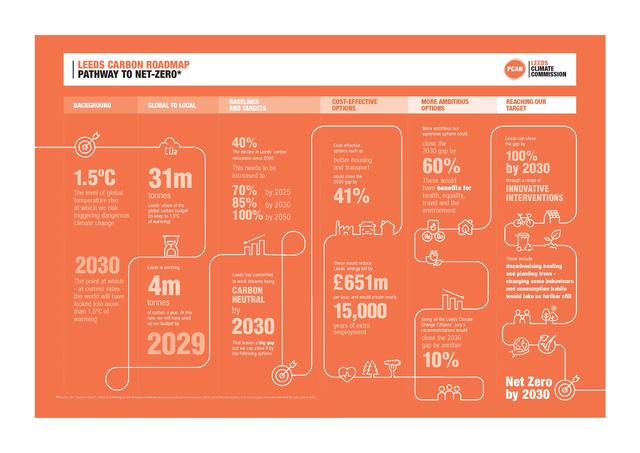Climate Commission shows moving to net-zero emissions can help Leeds’ post-Covid recovery
7th January, 2021 - 19:00

Taking action on climate change could save Leeds £651m per year and create 1,500 jobs for the next decade, a new report has revealed.
These social and economic benefits could be a central part of the city’s post-Covid recovery plans says the Leeds Climate Commission, which has produced a Net-Zero Carbon Roadmap for Leeds. It shows how the city can achieve its ambition of net-zero emissions by 2030 with many positive benefits for health, equality, travel, housing and the environment.
Leeds City Council passed a climate emergency motion in 2019, which included working to make Leeds carbon neutral by 2030. It is among the most ambitious climate targets in the UK and 20 years ahead of the national target of net-zero by 2050.
The motion also resolved to sign up to science-based targets consistent with the Paris Agreement, which aims to limit global temperature increase to 1.5 degrees. 2030 is the point at which the world is likely to have locked into more than 1.5C of warming, risking triggering dangerous climate change.
The Leeds report, which looks at the direct carbon emissions from all fuel and electricity use in the city, shows that if the city continues to emit the greenhouse gas at current rates, Leeds will have used up its entire share of the global carbon budget in just nine years’ time.
Citizens' Jury impacts calculated
It also calculates the impact of acting on the recommendations of the Leeds Climate Change Citizens’ Jury, which would reduce the gap between where we are now and where Leeds needs to be by 2030 by ten per cent – on top of a raft of other cost-effective and more ambitious options.
Finally, the report examines a range of innovative interventions, including hydrogen-based heating, electrification of heating and cooking, zero-carbon heavy goods transport and massive reforestation programmes that could deliver the remaining shortfall in emissions cuts to make the 2030 target a reality.
The Leeds Roadmap was presented by Professor Andy Gouldson of Leeds Climate Commission at an online event on 7 January 2021 (watch the video of the presentation, stakeholder responses and Q&A).
It updates earlier reports by the Climate Commission with refreshed data, showing a more optimistic outlook than previous analysis as some low carbon options have already become cheaper and better.
Pathway for a post-Covid recovery
The Roadmap also shows the pathway to economic recovery, post-Covid – although the analysis shows that, while stringent lockdowns did reduce our carbon footprint temporarily during the first lockdown, we need more sustainable ways of reducing our carbon footprint in the longer term.
Writing in the Preface of the report, Commission Chair Andy Gouldson and Vice-Chair Cllr Lisa Mulherin say:
“The world has changed in 2020 with the coronavirus pandemic. From a climate perspective, it triggered some changes in our behaviour that could help us in the longer term – but we clearly need a more positive way of addressing the climate challenge in the context of a healthy, inclusive and vibrant city.
“This roadmap shows how, in the years to come, Leeds can radically reduce its carbon footprint whilst also becoming a better place, with cleaner air, improved public health, reduced poverty and inequality, increased employment and enhanced prosperity. The opportunities to stimulate the development of the city through climate action clearly highlight the need for a green recovery plan with investment in the decarbonisation of our homes, our businesses and our transport systems at its heart.”
The report does not address the impact of indirect emissions that relate to the wider carbon footprint of Leeds residents’ consumption of goods and services, for example through longer distance travel and aviation, including from Leeds-Bradford Airport. Work by the Climate Commission to tackle this is a priority and will be undertaken in future analysis.


